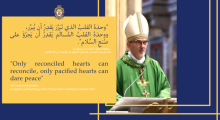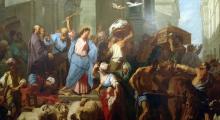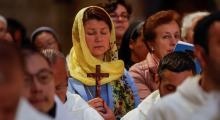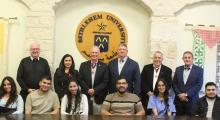Issued by the Catholic Center for Studies and Media - Jordan. Editor-in-chief Fr. Rif'at Bader - موقع أبونا abouna.org
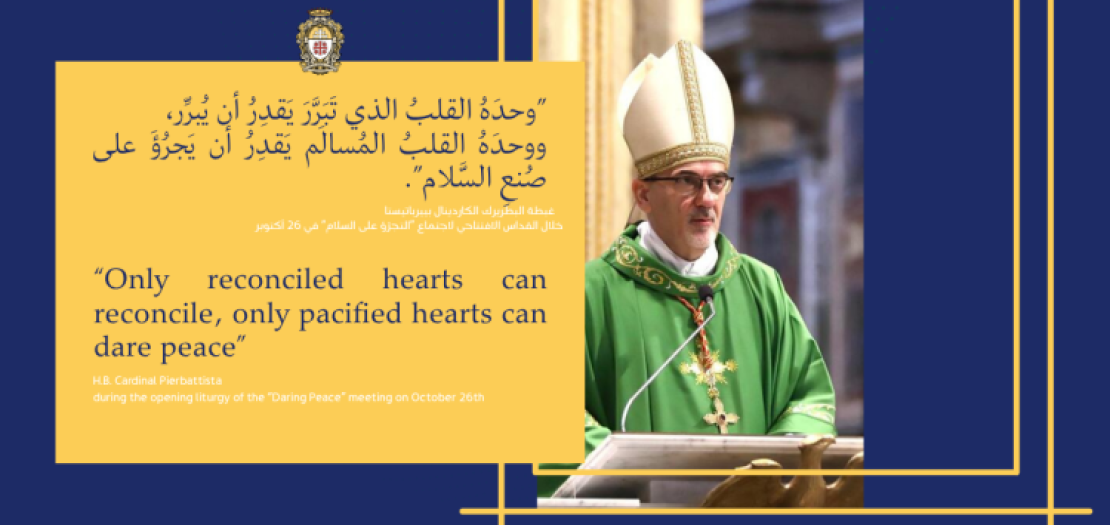
“Only those who recognize their fragility and need for mercy can become instruments of reconciliation…. Only justified hearts can justify. Only pacified hearts can dare to make peace,” said His Beatitude Cardinal Pierbattista Pizzaballa, Latin Patriarch of Jerusalem, in his homily at St. John Lateran in Rome, on October 26th, 2025, as he presided over the Eucharistic Liturgy, which opened the International Meeting organized by Sant'Egidio entitled “Dare Peace”.
The meeting which lasted for three days, brought together Men and Women of different faiths, cultures and socio-political status, all united with a yearn for peace. Thematic round tables and public meetings, focused on current conflicts, and the most urgent challenges facing our world today…at the heart of this meeting was a declaration that peace is worth daring for.
Justice That Comes from Mercy
Reflecting on the Gospel, His Beatitude drew a sharp contrast between the Pharisee and the Tax Collector: One trusts in his own righteousness; the other stands humbly before God, aware of his sin and in need of mercy.
“It is God who justifies, who does justice,” the Patriarch explained. “He does so by forgiving, because only His forgiveness makes us worthy to stand before Him — reestablishing the covenant between men.”
Peace, then, begins not with power or moral superiority, but with truth — the truth of our hearts before God. “Recognizing our weakness allows God to act in us,” he said. “When we recognize our need for mercy, we also allow others to show us mercy. And mercy is the foundation of all justice, on which a solid and true peace can be built.”
The danger of self-righteousness
In contrast, the attitude of the Pharisee reflects what the Patriarch called “the presumption of being right.” This attitude, he warned, can hide not only in individuals but in entire institutions. “How much suffering can be caused,” he lamented, “in the name of one’s own idea of justice, imposed outside a context of respect and listening!”
Such a mindset, he continued, breeds division and violence — the very opposite of peace. “Many today set themselves up as judges, convinced that they are right. But the Gospel reminds us that it is not the force of our judgment that justifies us, but the truth of our hearts before God.”
Mission of the Church
Turning his gaze to the Holy Land, His Beatitude spoke with compassion about the pain that so many are enduring. “No one has the right to minimize this suffering,” he said. Yet he also cautioned against allowing pain to harden hearts or give rise to hatred. “We must not become like the Pharisee who thinks himself better than others.”
The Patriarch emphasized the mission of the Church: “to bring to the world’s attention the lives of those whom many would prefer not to see — those who are real, who exist, and who await our response.”
The face of peace
For many who live amid the daily struggle for survival, the word “peace” may sound empty. Yet, His Beatitude reminded the faithful that true peace is not merely the absence of war or the result of diplomacy. “Peace,” he said, begins when we recognize “the truth and dignity of every human being. It is knowing how to see the face of God in others. When the face of the other disappears, the face of God also vanishes — and with it, the possibility of authentic peace.”
The need for witnesses of hope
During these dark times, His Beatitude acknowledged, courageous witnesses have restored truth to the words of justice and peace. Those who have lost much during the recent violence in Gaza yet chose to be a source of hope for others by continuing to offer their service: “Those who, under the bombs, offer protection, hungry families who share what little they have with those who have lost everything, young people who risk their lives to help the wounded and the sick, mothers who come together to care for children left alone, and teachers without schools who do not give up looking for their students to continue teaching them.”
With these words, His Beatitude encourages us to be an image of truth, of justice, and peace, although we might be suffering much, to not get isolated in the self but seek the other then we will “continue to be, indispensable instruments of consolation and hope, the ones willing to rebuild new models of coexistence from the rubble of this time.”
A prayer for new hearts
“Peace,” he said, “is based on faith and conversion to God.”
Without Him, our efforts remain fragile. “If we build human coexistence solely on power and superiority, we build on sand. When man becomes his own master, he ends up ruining himself. But when we allow God to act in us, peace becomes possible — even in the Holy Land.”
“All is not lost,” the Patriarch concluded. “There are still righteous people capable of divine justice — of bringing forgiveness and consolation, of recognizing one another as brothers and sisters, beloved children of God.”
He ended in prayer:
“Today, let us ask the Lord to give us a new heart — a heart that knows how to weep for the pain of the world, that does not close itself in fear, but opens itself to trust. A heart that, like that of the tax collector, knows how to say: ‘O God, have mercy on me, a sinner,’ and begin again.”
Echo from the Holy Father
Later that day, Pope Leo XIV echoed the Patriarch’s appeal during his General Audience, deepening the same call to a peace grounded in faith and humility. “War is never holy, Only peace is holy — because it is willed by God.”
He went on to recall the words of his predecessor, Pope Francis: “We must prevent religions from becoming instruments of nationalism or populism. Wars only escalate. Woe to those who try to drag God into taking sides!”
May the voices of both Shepherds remind us once more that true peace is born in a heart reconciled to God.


